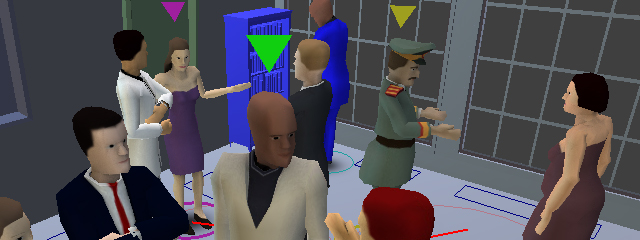[Note: This blog post was revised and edited on April 21st]

One of the major perceived advantages of being an indie developer is the freedom to be experimental with one’s games. As opposed to their mainstream brethren, indie developers do not need to deal with the pressures of making multimillion dollar AAA titles that necessitate huge sales and thus need to appeal to the widest possible audience. Instead indie developers because of their small budgets are freer to be experimental and stray from the tried-and-true path.
Yet the popular definition of experimental indie games over the past few years has seemed to become narrower and narrower. When the subject of experimental games is broached successful titles like Braid and Portal are quickly brought up. And these games and their brethren have come to define experimental. Games that are primarily built around a single novel mechanic (or as some may deride a gimmick) are the new flavor of experimental.
Steve Swink (of various indie fame including the game Shadow Physics), himself a presenter at the last Experimental Gameplay Workshop, has also thought about this increasing calcification of experimental and wrote a blog post about it. In it he comes up with his own loose definition of this definition of experimental.
[Experimental] meant finding a unique, promising mechanic dealing with spatial perception, imaginary physics, time manipulation, or some combination of the three and trying to squeeze all the possible interesting permutations of interactivity out of that one unique mechanic. Time, space, sound, color, structure. The criteria seems to be innovation as a mind-expanding riff on physics, and the games can almost always be seen as an attempt to answer one or two interesting questions as fully and satisfyingly as possible. And then culling the cruft.
In particular 2009’s Experimental Gameplay Workshop seemed to have a number of games that fit this definition. Games like Closure, The Unfinished Swan, Miegakure, and Swink’s own Shadow Physics are all based around a single novel mechanic. The innovation in these games is discovering this novel mechanic and playing with variations and permutations of it.
This is not to criticize any of those aforementioned games (in fact having played a number of them they’re all fun and interesting titles). The structure of these games (and other experimental titles like it) is a natural result of the particular innovations they focus on. Games where a unique mechanic takes center stage are often best-served dishing up challenges in this bite-sized format to fully explore said mechanic.
In addition to natural design output there are more pragmatic reasons for creating experimental titles in this fashion. Despite being free to be experimental and innovative, even (most) indie developers still need to think about the bottom line a little bit. Wholesale experimentation with a game can often be tricky and lead to disastrous development experiences. By constraining the experimentation to a single mechanic the developer can help limit some of the riskiness inherent in trying new things. This also ties in well with the smaller budgets and smaller development schedules often associated with indie games. Sometimes all a developer has is the ability to develop a single novel mechanic and properly focus on it. Finally, even in indie games there is some bias towards emulating previous hits. Past experimental indie successes have followed this popular mold and developers are often inclined to emulate the same approach.
But while these reasons might help explain the current definition of experimental games it still doesn’t alleviate a growing sense of dissatisfaction that experimental can – and should – encompass much broader things. The cancellation this year of the Experimental Gameplay Workshop at GDC is a sign of this dissatisfaction. Both as developers and players we’ve been too quick to constrain what experimental can be.

Instead of looking to past experimental successes for guidance we should instead think about experimental a little differently. Games like B.U.T.T.O.N. and Chris Hecker’s SpyParty (which has been presented at the Experimental Gameplay Workshop in the past) that focus on much on interactions outside of the game as those in the game are experimental in a way that’s not just a new time-manipulation mechanic exploited over a series of puzzles.
But really the arguing of what’s regarded as experimental right now is beside the point. I’m not arguing really for a redefinition of experimental, but rather not to let the popular view of experimental hinder the future development of new, interesting, and experimental ideas in games. Games already are oft-criticized for relying too heavily on mechanics and structures that have been in place since the first arcade machines started bleeping blooping. And we shouldn’t let experimental games go down that same path.
Leave a Reply